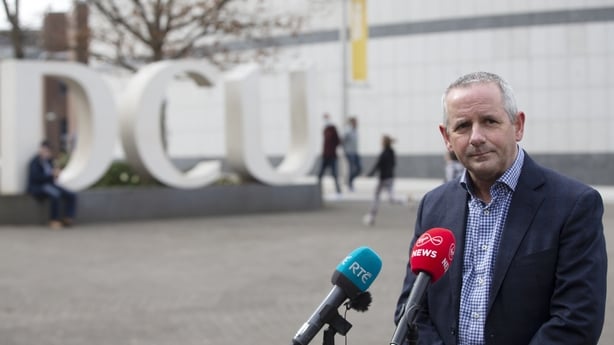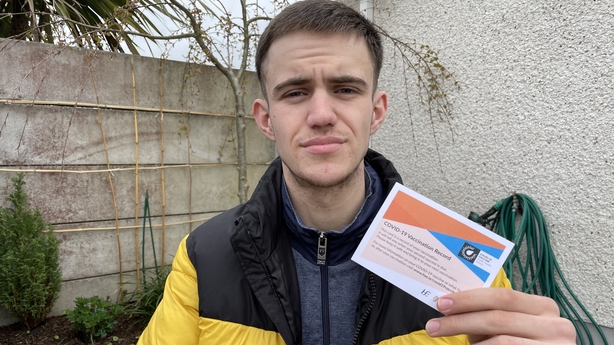The Health Service Executive has resumed administering the AstraZeneca vaccine at several hospitals across the country.
HSE Chief Executive Paul Reid said the priority is to resume the programme for the 30,000 people who were due to receive the vaccine this week.
Mr Reid said the HSE wants to restart the AstraZeneca vaccination in "a safe way", adding that he is conscious of vaccine hesitancy but wanted to reassure people of the benefits.
Speaking on RTÉ's Today with Katie Hannon programme, Mr Reid said people will not be offered another vaccine if they turn down the one that is offered to them.
He said all three vaccines being administered in Ireland have proven to be effective and safe and the HSE is basing this on advice from the European Medicines Agency and from the National Immunisation Advisory Committee also.
"Overall it is not a choice, can I have that one over the other one. All vaccinations are proven safe and effective."

He said people can turn down a vaccine as there is no legal compulsion. However, Mr Reid reminded people of the success rate to date from the Covid-19 vaccines across nursing homes and among healthcare workers, and the over 75s, describing it as "phenomenal" and "fantastic".
Mr Reid also said that he believes by the end of next week the vaccination all of frontline healthcare workers will be completed and the HSE will then move on to the next priority groups.
"We will use this week to finalise any last ones."
Leaflets have been sent to hospitals for patients detailing the latest scientific updates for the vaccine.
Beaumont Hospital recommenced its AstraZeneca Covid-19 vaccination programme at 8.30am following recommendations from NIAC.
Blanchardstown and Connolly hospitals have also restarted their programmes as well as other hospitals in Cavan and Kerry.

18-year-old Jack O'Brien, from Navan in Co Meath, was among those to receive his vaccine in Beaumont Hospital this morning.
The Leaving Cert student, who received a kidney transplant in 2005, had been due to receive his first dose of the AstraZeneca vaccine last weekend when he received a text to cancel his appointment just an hour and a half before it was meant to happen.
The HSE said it hopes to see supplies of all three vaccines increase over the next three weeks.
The use of the vaccine had been paused for six days pending an investigation by the European Medicines Agency after a report of very rare blood clotting events in Norway.
The EMA concluded that the vaccine is safe and effective and is not associated with an overall increase in blood clots.
This morning, as we recommence the AstraZeneca vaccine, our plan to protect some of the most vulnerable also continues. Today & tomorrow, 3,700 over 75 year olds, patients of GPs, will receive either first & second doses in the Helix vaccination centre @DCU. @ICGPnews #COVID19
— Paul Reid (@paulreiddublin) March 20, 2021
The chances of the very rare blood clotting events that occurred in recipients of the AstraZeneca vaccine in Norway and in Germany has been calculated by health experts to be "one in a million" cases, and that is 200 times less likely than the already very low risk of young person dying from Covid-19.
Although no causal link between the AstraZeneca vaccine and those very rare blood clots could be established, the European Medicines Agency has said people being offered the vaccine must now be given updated information on what to be aware of in relation to these very rare events.
This has cleared the way to vaccinate a relatively modest number of medically vulnerable people in acute hospital settings this weekend, with much more to follow among health care workers and medically vulnerable people over the coming week.
Mr Reid tweeted this morning that 3,700 over 75 year olds will receive either their first or second doses at the vaccination centre at the Helix on Dublin City University's campus this weekend.
These were the two groups who were directly affected by the pause in use of the AstraZeneca vaccine from last Sunday.
The HSE is working to reschedule vaccination clinics for these groups, and said it will be in touch with colleagues, or patients, to organise those appointments.
Work has continued throughout the past week to identify medically vulnerable people at risk of developing severe illness from Covid-19 who are due to be invited for vaccines.
The HSE and the wider health sector are working to invite those people for vaccination, primarily through hospital services, and the wider disability and mental health sector.
The HSE may also seek to contact people through their GPs, and through public information and advertising.
For now, it is asking people in this medically vulnerable group not to take any action.
They do not need to ring their GP or hospital. The HSE and healthcare teams will be in touch with these individuals when their vaccine is available.
Read: Latest Covid-19 stories
Before the decision to resume the AstraZeneca vaccination programme this weekend the HSE already had plans in place to vaccinate between 75,000 and 85,000 people next week using the Pfizer and Moderna mRNA vaccines.
Between 70,000 and 75,000 of those vaccinations will be focused on the 75 to 79-year-old age group and will be delivered in the community through the national GP network.
The expectation is that by the end of next week between 240,000 and 250,000 people over the age of 70 will have been vaccinated.
In addition, about 1,000 front line healthcare workers and 3,500 residents of long-term healthcare facilities are due to receive vaccination doses next week.
In all about 5,500 medically vulnerable people had vaccinations postponed last weekend when the use of the AstraZeneca Vaccine was suspended.
The HSE will now be aiming to catch up on those vaccinations, and to make progress vaccinating the next 20,000 patients from this cohort, now that the use of the AstraZeneca vaccine can be resumed.
"We have the option of banning a planned export. That's the message to AstraZeneca: you fulfil your contract with Europe first before you start delivering to other countries," Ms von der Leyen said in an interview with Germany's Funke media group.
Additional reporting Dimitri O'Donnell
